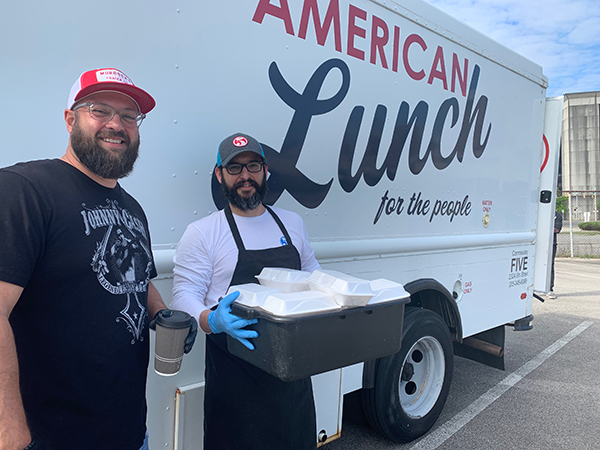By Grace Thornton
The Alabama Baptist
When the news about coronavirus-related church closures first started floating around in Birmingham, Pastor Keith Akins lay in bed at night staring at the ceiling.
“I was having trouble sleeping at night thinking about some of our friends going without food,” he said.
Since November 2016, his church — the Church at Southside — has largely been made up of homeless people who gather in a parking lot in downtown Birmingham to eat a meal and worship God. They’ve met rain or shine ever since — and that includes snow and hurricanes.
Counting on a meal
On a normal week, Akins pulls a food truck up, and his team unloads tables and large dishes of food church members and volunteers serve to the people lined up — people who count on that meal every week. For that reason, the church staff didn’t want to miss a Sunday if they could help it.
“The first week we started hearing about the coronavirus, we thought, ‘Let’s still go; we’ll be safe in how we do this,’” Akins said.
At that point, some groups who normally provided food to the homeless had pulled out because of COVID-19, he said. “People were showing up hungry. Some of them hadn’t eaten in a day or two.”
But after his team served as safely as they could that Sunday, all churches in the state were told they couldn’t gather in large groups on Sundays for the foreseeable future, a measure aimed at slowing the spread of COVID-19.
“It was just killing me emotionally and spiritually to think about not showing up,” Akins said. “We had built this trust that rain or shine we’ll be here. We had been out in rain, hurricane weather and snow, but this was a storm of a different force.”
Father’s provision
Akins was able to get the word out to his congregation that they would continue to offer food as long as they could within the limitations of the law. But he faced a lot of new questions — how could the church feed people when they can’t gather as a group? And even if they could figure that out, how do they buy enough food to prepare a meal that large when they are limited in the quantities of items they can buy from the store?
“The week after hearing the news that we couldn’t meet as a group, we got there early with a skeleton crew and more than 100 pre-packaged bags of nonperishable food, baby wipes and other things we thought might be helpful,” Akins said. “As people walked up, we would catch them, give them a bag, tell them we loved them and then asked them to go on their way so we didn’t gather a crowd.”
His hope was that throughout the week as they opened the food items, they would feel the Father’s love and provision for them.
“They are some of the most forgotten people in our city, and it’s a huge deal to be remembered,” he said. “They’re loved by God, and the church is a small part of that story.”
And even though the bags worked fine, Akins and his leadership team still wanted to serve them a meal. So they held a Zoom meeting to brainstorm, and team member Whitney Anderson thought it might be an opportunity to help a local restaurant too.
“We know the restaurants are hurting really badly right now too,” Akins said. “So we wanted to check around to see if we could bless one of them by paying them to make meals for our church.”
Church member Heath Echols began reaching out to local restaurants to see if there was a way the church could partner with one of them. Eventually, he discovered local restaurant FIVE already had a food truck called American Lunch that served free meals to anyone who needed it on a regular basis.
“With everything that’s going on, they had already switched from five days a week to seven days a week,” Akins said. “They said they would be happy to help us, and we could give a donation if we wanted.”
Back in business
And with that, the church’s meal service was back in business. They still distribute bags of food too. Akins also gives a message every week on Facebook — something many in the church have access to — to share truths with them and remind them they’re not forgotten. Through the years, people who have observed them on the fringes have slowly been drawn in by the love and not just the meal, Akins said. They’ve become involved in the worship service, and some have met Jesus for the first time.
He said he hopes that through this unusual season, they’ll continue to feel like the love the church shows them is a different kind of love.
“We tell them to hang in there and that hopefully we’ll be back to normal soon,” Akins said. “We want them to know we’re not going anywhere.”
He also hopes this crisis helps serve as a reminder for the Church to care for the people who feel isolated all the time, not just during a pandemic.
“As the Church, I think we’ve become good at ‘social distancing’ from the people who are most vulnerable, even when things are normal,” Akins said. “I believe He’s showing us (through this time) that church is more than our services and gatherings — it’s time to reengage our world outside the walls.”






Share with others: